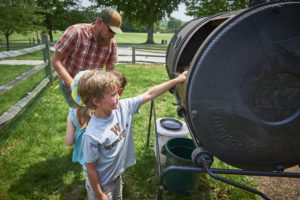Tackle Food Waste One Scrap at a Time
Caring for our environment is one of the three priorities defined in Westtown School’s Strategic Vision. To continue our important work in this area, we have been partnering with sustainability consultants, Boyer Sudduth Environmental Consultants. This piece was written by Claire DuBois, Sustainability Intern with Boyer Sudduth. 
Lower School Science Teacher Amanda Jeane Strode is passionate about helping Westtown meet its sustainable goals when it comes to waste. She incorporates recycling lessons into her science curriculum with hands-on activities. Fourth graders gather data, collect and sort recyclables, and transport them to the dumpster.
From Recycling to Composting
Encouraged by the success of the recycling efforts, Strode and her students are now tackling food scraps by re-engaging the composting program. Strode notes that students were excited to begin composting again. “We started in mid-February, and so far, it’s been a success!” Teachers were equally as excited and all have helped place compost bins in the classroom, posted new signs about composting, and encouraged students to take on this responsibility.
Compost versus Landfills
Strode teaches students what goes in the compost, what stays out, about decomposition of organic material, and what happens when food scraps are composted instead of sent to landfills. She teaches how decomposers and bacteria thrive in the aerobic conditions of a compost pile, which helps food scraps break down and return nutrients to the soil. The students are also learning how food waste that ends up in a conventional landfill does not easily break down due to the anaerobic conditions. They are learning how in these conditions bacteria turns the food waste into methane, a powerful greenhouse gas 25 times more potent than carbon dioxide.
“Teaching students about how their daily choices can lead to drastically different environmental impacts is key,” notes Strode. “It helps them really understand why they are composting.”
Students Take Charge of the Compost
The student-run composting process is simple and streamlined. Each lower school classroom has a small compost bin for leftover fruit and veggie scraps. Once a week, student “compost collectors” take the food scraps to a larger, compost tumbler on the mini-farm outside the Lower School. The organic material then makes its way to Westtown’s larger organic farm where Farmer Tim Mountz works closely with students to teach them about agriculture. “Composting is important because it reduces the reliance on synthetic fertilizers,” notes Farmer Tim. “It also improves the soil’s water retention ability so you don’t have to use as much water. It’s a closed loop system.” This hands-on experiential learning allows students to see how they can put their food scraps to work for a good cause.
Why Reduce Food Waste?
Hands-on composting is a great way for students to visualize how much food is wasted. Did you know that a startling 40% of food in the U.S. never makes it from “farm to fork” and instead ends up in a landfill? (Source: 2017 “Wasted” report by NRDC.) According to the EPA, in 2018, out of the 292.4 million tons of trash, the United States produced, only 25 million tons were composted.
.Director of Outdoor Education, Chris Henwood-Costa engages students directly with nature’s inherent rhythms of decomposition through her Farm and Forest classes. When asked about food waste, Costa notes, “Students see how leaves and plants decompose naturally on our forest floor in order to feed the trees and they make connections to the role that composting our food waste plays in this system of feeding our gardens.”
Future Environmental Stewards
First-hand experience with composting urges students to be more aware of their own waste habits as they move through Westtown, and encourages them to connect their choices to climate change on a global scale. Thanks to the community of committed friends at Westtown, the school is making strides to reduce their food waste while building future environmental stewards with one food scrap at a time.


